

Herbal Apothecary 101: Distillates, Hydrosols and Tinctures. Distillates and hydrosols: the aromatic liquids that remain after essential oils have been distilled from plants.
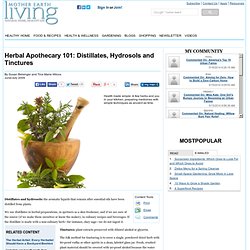
We use distillates in herbal preparations, in spritzers as a skin freshener, and if we are sure of the source (if we make them ourselves or know the maker), in culinary recipes and beverages. If the distillate is made with a non-culinary herb—for instance, clary sage—we do not ingest it. Tinctures: plant extracts preserved with diluted alcohol or glycerin. The folk method for tincturing is to cover a single, powdered dried herb with 80-proof vodka or other spirits in a clean, labeled glass jar. Fresh, crushed plant material should be covered with 90-proof alcohol because the water contained in the fresh plant dilutes the tincture. Herbal Apothecary 101: Elderberry Shrub with Honey. Makes about 2 quarts Shrub is a term for an acidic iced beverage that is sipped in small quantities.
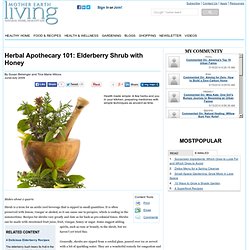
It is often preserved with lemon, vinegar or alcohol, so it can cause one to perspire, which is cooling in the summertime. Recipes for shrubs vary greatly and date as far back as pre-colonial times. Herbal Apothecary 101: Echinacea Summer Tincture. Makes about 1 cup Echinacea stimulates the immune system.
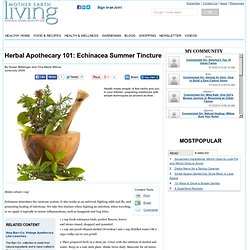
It also works as an antiviral, fighting colds and flu, and promoting healing of infections. We take this tincture when fighting an infection, when traveling, or we apply it topically to minor inflammations, such as hangnails and bug bites. • 1 cup fresh echinacea buds, perfect flowers, leaves and stems rinsed, chopped and pounded • 1 cup 190 proof ethanol alcohol (Everclear) and 1 cup distilled water OR 2 cups vodka (90 to 100 proof) Herbal Apothecary 101: Herbal Syrup. Makes about 2 cups Herb syrups are wonderful flavor essences.
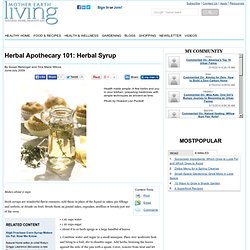
Add them in place of the liquid in cakes, pie fillings and sorbets, or drizzle on fruit. Brush them on pound cakes, cupcakes, muffins or breads just out of the oven. • 1 1⁄2 cups water • 1 1⁄2 cups sugar • About 8 to 10 herb sprigs or a large handful of leaves. Herbal Apothecary 101: Medicinal Syrups. Medicinal syrups often are prepared with sugar or honey, usually at a proportion of 2 parts sweetener to 1 part liquid, or sometimes in equal parts.
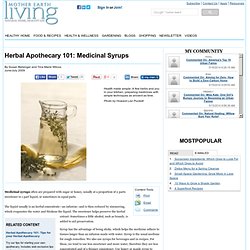
The liquid usually is an herbal concentrate—an infusion—and is then reduced by simmering, which evaporates the water and thickens the liquid. The sweetener helps preserve the herbal extract. Sometimes a little alcohol, such as brandy, is added to aid preservation. Syrup has the advantage of being sticky, which helps the medicine adhere to tissues longer than an infusion made with water. Syrup is the usual medium for cough remedies. Susan Belsinger and Tina Marie Wilcox use herbs every day in and around their homes and greenhouses. Herbal Apothecary 101: Herbal Decoction. Makes about 1 quart The amount of plant material will vary depending upon which plant you are decocting.
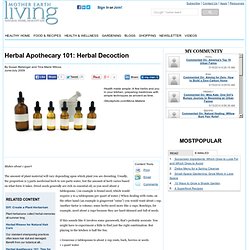
Usually, the proportion is 5 parts medicinal herb to 100 parts water, but the amount of herb varies based on what form it takes. Dried seeds generally are rich in essential oil, so you need about 2 tablespoons. Herbal Apothecary 101: Herbal Infusion. Makes about 1 quart Sometimes we prepare an herb infusion with a single herb or flower.
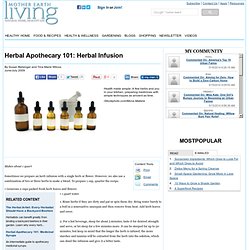
However, we also use a combination of two or three herbs to make a blend. To prepare 1 cup, quarter the recipe. • Generous 2 cups packed fresh herb leaves and flowers • 1 quart water. Herbal Apothecary 101 - Natural Remedies. Since before written history, plants have been allies to human beings—whether our ancestors were eating vegetation, capturing its essence in soups or healing with poultices like those described in ancient Egyptian surgical papyri.
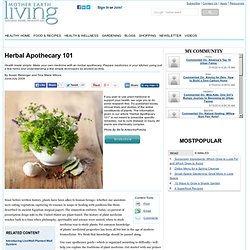
The connection endures: Today, 25 percent of prescription drugs sold in the United States are plant-based. The history of plant medicine reaches back to a time when philosophy, spirituality and science were united; when to study medicine was to study plants. Yet common knowledge of plants’ medicinal properties has been all but lost in the age of modern biomedicine. We think that knowledge should be passed along. Our easy apothecary guide—which is organized according to difficulty—will help you explore the traditions of plant medicine. Herbal Apothecary 101: Infusions, Decoctions and Syrups. Infusion: a beverage made from herbs.
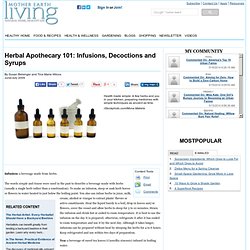
The words simple and tisane were used in the past to describe a beverage made with herbs (usually a single herb rather than a combination). To make an infusion, steep or soak herb leaves or flowers in water heated to just below the boiling point. You also can infuse herbs in juice, milk, cream, alcohol or vinegar to extract plants’ flavors or active constituents. Bien être. How To Get Kids To Sleep. One of the main challenges I face as the mom of four young kids is bedtime.
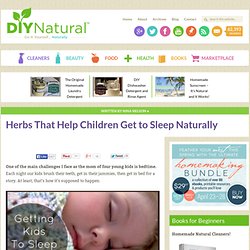
Each night our kids brush their teeth, get in their jammies, then get in bed for a story. Top Ten Natural Remedies For Allergies. Please Share This Page: Photos du journal - Herbs, Health and Happiness. Photos du journal - Herbs, Health and Happiness. 48 Foods To Balance Your Hormones & Give You Glowing Skin. Getting Started with DIY Natural Projects. One of my favorite things about being a DIY-er is that I can teach what I learn to others, and I’m especially fond of sharing ideas with DIY beginners unsure of where to start.
These people are eager to make changes and get to see quick results that encourage them to continue pursuing this lifestyle. However, some challenges DIY beginners face is that this lifestyle is either: too expensivetoo complicated – it takes too long, orit’s too… different. And it’s true, you can run into all of these challenges when you’re making the switch to a DIY lifestyle. But you don’t have to. You can keep it simple and make the switch a lot easier by simply opting for better versions of the things you already use in your own home. 1. Try switching to homemade bread with a few simple ingredients. I’ve used it for years now to bake delicious bread, rolls and pizza. Top 10 Superfoods. If optimal health is your goal, there's no getting around your diet.
Your physical health is a direct reflection of what you put into your body, and how you live your life in general. Pre-packaged processed foods may be convenient, but cooking from scratch using fresh unprocessed ingredients is an absolute must if you want to improve your health. The term "superfood" has become something of a marketing buzzword in recent years, and many processed food products will boast such ingredients. Environmental News and Information. Find Locally Grown Food. Blog - President Obama: Keep Your Campaign Promise to Label GMO Foods Video via.
Food DemocracyNow.org Something important for you to read today: On July 23, the U.S. House of Representatives passed a bill which is intended to PERMANENTLY prevent passage of any state or federal law mandating the labeling of GMOs in your food.